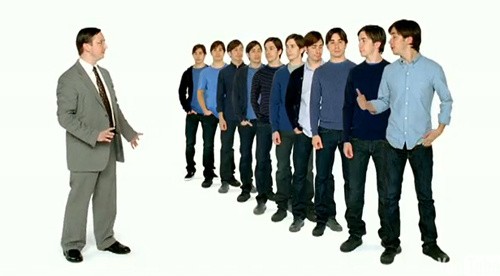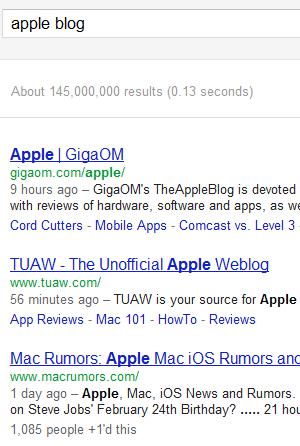Blog / Moving to Mac
- Date
- December 24, 2011
- Tags
I wonder how many Mac purchasers feel compelled to write an essay justifying their decision. Probably not many. But as someone who’s identified as a PC user for decades, I haven’t made this choice lightly. Nor consistently: I’ve bought and returned two Macs since Snow Leopard, but this time I’m determined to make it stick. Here are some of my reasons and reservations.
One thing that kept me from making the switch was Apple’s Get a Mac campaign with John Hodgman and Justin Long. The ads were clever and funny, sure, but to people who knew something about their Windows PCs they were insulting and inaccurate. In “Camera”, Mac claims to be more compatible with random Japanese hardware than Windows. Not that digital cameras aren’t all the same, but Apple’s hardware compatibility pales in comparison to Windows. The Vista jabs were on point and, yeah, there’s no end to Windows viruses. But it’s funny that in “Made for Work” Apple claims that Windows PCs are designed primarily for office tasks, forgetting the millions of gamers who choose Windows because they want to play more than just Blizzard titles. That’s changing thanks to the Mac App Store and Steam, but I’m keeping my Windows desktop around so I can play some new video games once in a while.
Apple’s decision to start software patent thermonuclear war also held back my purchase. Sensible nerds agree that the U.S. patent system is broken regarding software patents. Good companies that have patents only use them defensively, to ward off attacks from patent trolls. For a long time Apple was a good company in terms of patents.

And then Android came along. Feeling personally slighted, and apparently having forgotten how well the 1994 Apple Computer, Inc. v. Microsoft Corporation lawsuit turned out, Steve Jobs sent Apple’s lawyers to sue the manufacturers of Android phones. While I’m sympathetic to the claim that Android looks a lot like iOS, trying to sue Android out of existence seems less like corporate competition and more like a personal vendetta. They’re using software and design patents to try and stop the sale of Android phones and tablets, not just negotiate licensing agreements or royalty payments. Even Microsoft, who is also applying pressure to Android manufacturers through patent lawsuits, is happy to take a check and be on their way.
Related to Android is the whole “open” issue with Apple. For the record, I’m not one of those people who concocts his own definition of “open” and ridicules Google for not adhering to it. The Android 3.0 issue aside, they’re doing a fine job. If Amazon can take a version of Android and make their own tablet without incurring a lawsuit from Google, that’s open source. What saddens me is Apple’s goal to lock down their computers to the extent have their mobile devices. Already you can’t choose the graphics chip in your Mac, nor buy an extended battery. The MacBook Air can’t be opened to replace its SSD and memory. Apple’s only user-modifiable desktop tower starts at $2,500 and is rumored to be discontinued soon.
Some people don’t care about being able to upgrade or customize their computer, but I do, and there’s a feeling of unease that comes with Mac ownership. If something breaks, don’t try and fix it yourself. You can’t. Take it to the Apple Store. Want a better frame rate in that game? Pick up your computer and toss it out a window. Then go buy a whole new machine. You’re discouraged from experimenting on your Mac. Either love it as it was born or reject it entirely. And you wonder why people form emotional attachments to these things.
Granted, it’s not much better on the PC side of the fence. Intel’s Ultrabook concept encourages manufacturers to chase the MacBook Air, and the abundance of screws and multiple parts creates less elegant machines. But there’s a joy in learning how to put a desktop computer together, buying the parts, and struggling to make an inert cube of silicon come to life. That magic and feeling of ownership doesn’t exist in Apple’s ecosystem. Your iPad and mine differ only by their color, wallpaper, and apps.
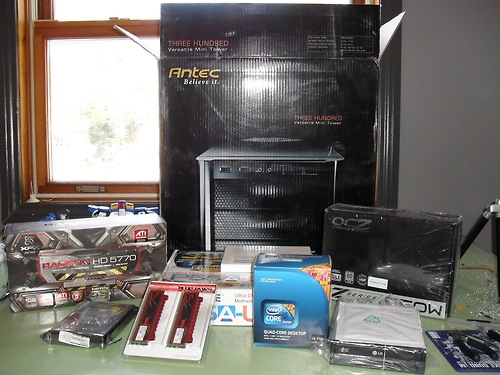
The Mac App Store could be the last stake to close the coffin, but I’m not so sure. I can definitely see a future where the App Store is the only way to get software on your Mac unless you pay $99 per year for a developer license. That would repel most computer-savvy people and cause a huge uproar among programmers. On the other hand, the App Store is going to become the de facto software repository for the Mac even if Apple does nothing. It works great and integrates well with the OS. If you didn’t know who Richard Stallman was, why would you care?
Bonus prediction: let’s say Apple locks down OS X 10.8 so you can only run software from the App Store. But you can download XCode from the App Store for free, and Apple lets you run software you’ve compiled yourself. In that case, the only way to distribute unapproved Mac software would be by providing the source code. Kind of a “put up or shut up” moment for open source advocates. Apple could kindle another vibrant open source community by paradoxically restricting the use of software on the Mac. The mind boggles.
As someone who keeps up with technology news, Apple’s permanent radio silence is annoying. No one at Apple blogs or tweets. There’s no roadmap for their products. It’s part of a theme you may have noticed: Apple wants control. They don’t attend trade shows, they don’t partner with companies, they don’t let you customize your hardware. If you’re not an Apple employee, all they’ll give you is a product and all they’ll take is a credit card. It lets them produce surprising hardware, but it’s impossible to know what’s coming next. Will the MacBook I just bought be outdated tomorrow, like my friend who bought a LED Cinema Display just before the Thunderbolt Display was introduced? You have to use divination (or realistically, the Mac Buyer’s Guide) to know when it’s a good time to purchase Apple stuff.
So given all this, why did I buy a Mac?
For one, choosing a Mac is easy. No, not because of the “paradox of choice” stuff. That applies when you haven’t done research on your choices or you don’t care that much about what you’re choosing. I experience the paradox of choice when I’m shopping for raspberry jam or picking out toothpaste. In the computing world, I’m comfortable having a dozen manufacturers sell a dozen types of laptops with thousands of hardware components for millions of combinations (another theme of this essay: I’m not normal).
What I mean is, finding a laptop on every single PC manufacturer’s website is a nightmare. The fact that they’re selling a dozen indistinguishable variants doesn’t help, but I can barely see what I’m picking. Try it yourself. Go to Dell, Asus, Lenovo and HP. Shop for a laptop and see if there’s even one manufacturer that lets you get a big, clear picture of the keyboard and trackpad shown under a human hand. What do they look like open, closed, or halfway? Can you get a clear answer on battery life in hours rather than number of lithium cells? What exactly comes in the box?
It’s unbelievable. Since everyone sells the same Intel chips and uses the same Microsoft software, the only way they can differentiate themselves is by the price and design of the hardware. But it’s impossible to find a PC manufacturer with big, clear pictures of their machines. I really would have liked to buy a Lenovo laptop. They’ve got great designs and legendary reliability. But nowhere on their site could I find anything like Apple’s Mac comparison page, where you can see pictures of all their hardware at once on a neutral background. Instead, Lenovo makes you choose between Thinkpad (productivity), Ideapad (entertainment) and Essential (versatility) brands (why?), then mouse over half a dozen low angle spy shots in each category. Maddening!
Listen you morons: this is one of the many reasons why Apple is killing you. It costs zero dollars to fix. You have an in-house web development team? Hand them a digital camera. All I want is seven high resolution pictures of each laptop (top, bottom, rear, left, right, lid open, lid closed), and one page where I can see thumbnails of all of them in a lineup. I can deal with your nonsensical branding and myriad choices, but not if I can’t even tell what I’m choosing between. Microsoft’s online store does the best job of reducing clutter, but their pictures are tiny and the font is too small.
All this is before you actually consider Apple’s hardware. Let’s be realistic: it is no longer overpriced. That’s a trope of the PC guard that died a few years ago. Now, you’re still able to find machines with comparable specs for less money, but the hardware construction counts for the difference. MacBooks don’t bend when you flex them. They don’t have stickers on their covers. Their power adapters are as small as possible so they don’t take up much space in your bag. They don’t use clicky clacky breaky clasps to open the screen. The hardware is simply of a higher caliber, and that’s why you pay a little more. If you think it’s too expensive, buy a refurbished model. They’re exactly the same as the new ones.
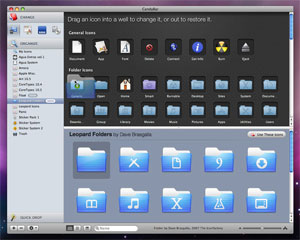
And then we come to software. This is the meat of my decision: I want those tools and toys. I want BBEdit and Things and Acorn, GitHub for Mac and RipIt and Candybar. Pages’ inspector window is an affront to mankind but its built-in picture frames are delightful. iMovie and GarageBand don’t even exist on Windows without shelling out hundreds of dollars to Adobe. The Mac App Store and the increased sales of Macs have brought Mac development to the forefront. Many of these utilities have their Windows equivalent, of course, but none have the same graphical design or attention to detail.
Normally this would be where I’d lavish praise on OS X Lion itself, but many of its benefits fall on deaf ears. It doesn’t get PC viruses: woo, neither do I, thank you Microsoft Security Essentials. It has automatic backup built-in: woo, don’t care, I use Dropbox and backup to an external drive already. It has Launchpad, an iOS-style app launcher: woo, I’ve used DragThing for years and never touched the dock. It has hand-stitched calendars and contacts apps inspired by the iPad: woo, those look terrible and I use Google Apps anyway.
Well, okay, time for a little praise. Mission Control is the only Exposé variant I actually enjoyed using. And installing apps from the App Store means I don’t have to worry about them littering files everywhere when I want to delete them (except XCode, apparently). The one good thing it’s taken from iOS is the improved auto-correction. And then there’s iCloud and iTunes Match, which should make recovery and portability easier.
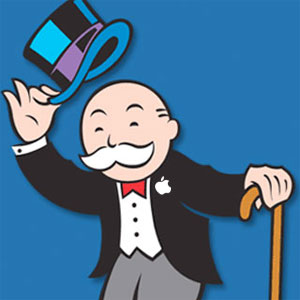
I couldn’t care less about Lion’s Unix commands or 64-bit security, but one big factor influenced my decision: iOS. I have an iPhone and an iPad. Uh, and an Apple TV and an Airport Extreme and two Apple keyboards. They work really well together. I can reset my Airport from my iPhone. I can push videos from my iPad to the Apple TV. All my music now appears on every device thanks to iTunes Match. This was all possible in the Windows world. I know, because I did a lot of it myself. But I’m not interested in doing it myself anymore. I bought these iOS devices for other reasons, and, like the railroads in Monopoly, they work even better if you buy the whole set.
It’s a weird shift in thinking for us PC folk. Macs are not the minority anymore, purchased by weirdos and hippies and artists. If you’re a hardcore gamer or system builder, yeah, Apple is not for you. Even I intend to buy Windows 8 for my desktop when it comes out. But I’m moving my web and software development to my MacBook. It does what I want and is better in the ways I care about.
Once, no one was ever fired for buying IBM. Today, no child ever cried after unwrapping an iPad on Christmas.

